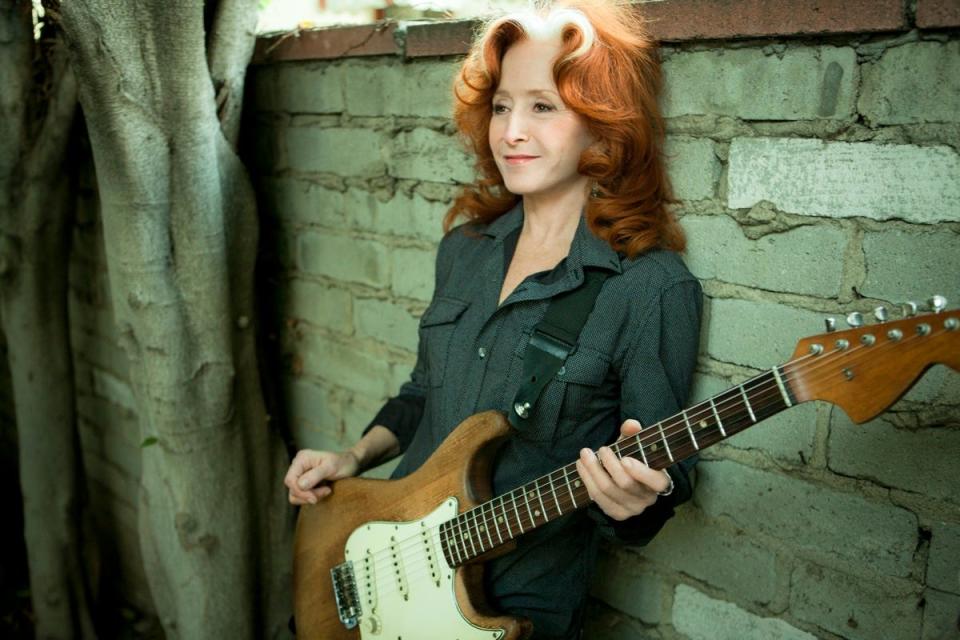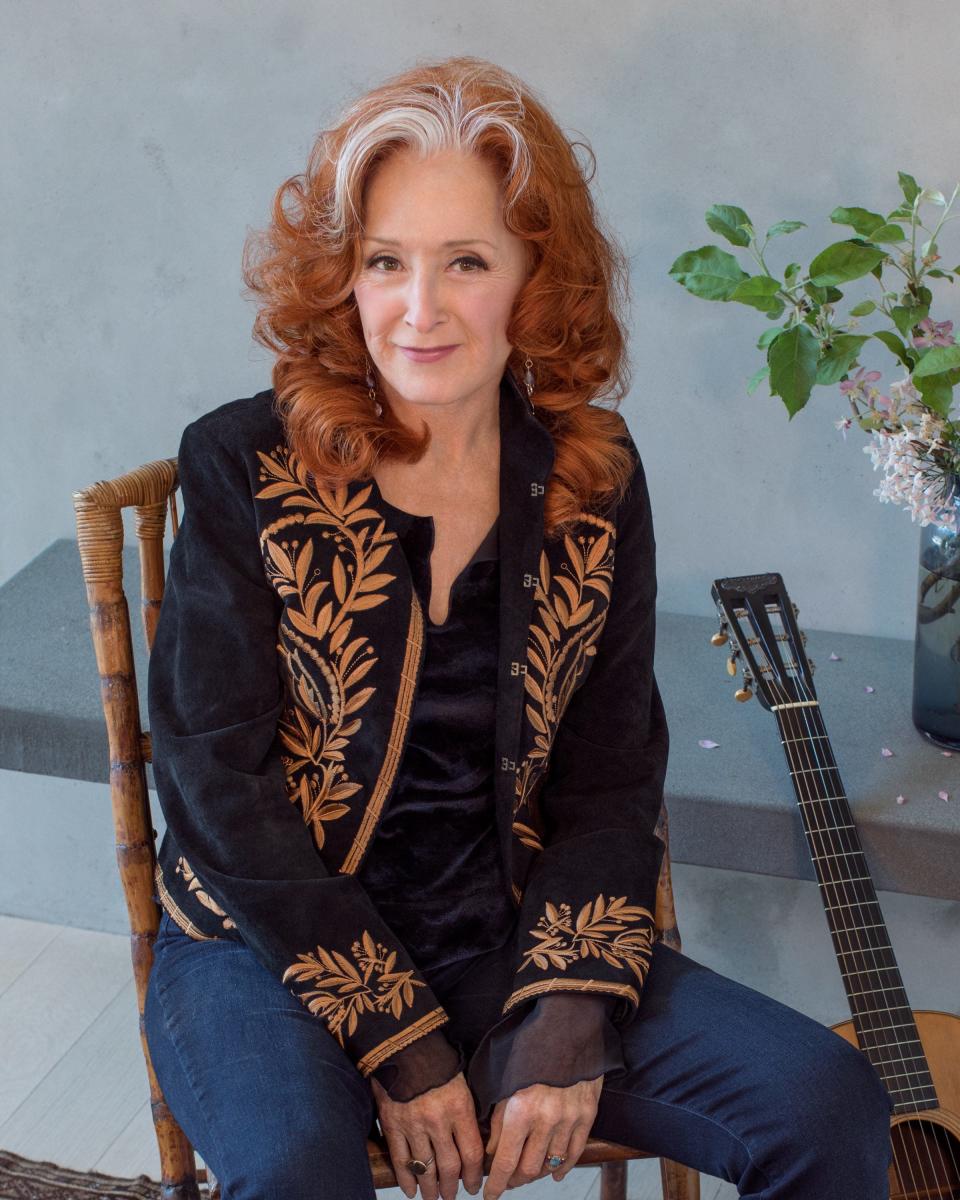How a Quaker summer camp inspired Bonnie Raitt's music career
- Oops!Something went wrong.Please try again later.
Bonnie Raitt returns to the Queen City July 19 at the Andrew J. Brady Music Center. Amassing 10 Grammy awards over her 50-year career, including the Lifetime Achievement Award, her authentic vocal style and virtuosic slide guitar can be found in the recordings of a host of blues and folk legends.
Nearly 20 years into her illustrious career, Raitt had already released 10 albums before her breakout “Nick of Time” in 1989, which was closely followed by hits like “Something to Talk About” and “I Can’t Make You Love Me.” We recently spoke about musical influences from her Quaker upbringing, her commitment to social justice and her most recent album, "Just Like That."
Question: Do you have any stories about Cincinnati?
Answer: I love playing Cincinnati. We've always had great audiences. I went to college on the East Coast and I'm from the West Coast. When I started my career all those years ago, it was a fun revelation to discover all the states in the middle and the great vibrant music scenes. Of course, you've got Chrissy Hynde, Rachel Sweet and Devo coming out of Ohio, not to mention the Ohio Players and Bootsie Collins.
We toured in the early '90s through Riverbend next to the racetrack. Charles Brown was our very special guest, a legendary rhythm and blues pioneer. He had gotten off the tour bus to go to the horse track and he said, I'll see you in time for the gig. But he didn't have his credentials on him. So here's this guy in his 70s, an elderly Black man in a mylar jumpsuit and a rhinestone baseball hat, trying to get backstage and they wouldn't let them in. We had to send somebody to the gate and say he's an important part of our show.

Q: When you were younger, you grew up in LA, but also went to summer camp in the Adirondacks. How did that West Coast – East Coast connection inform your career as a musician and activist?
A: My parents became Quakers after the second World War. You didn't need to get inside a church and pray to an altar or listen to a minister to get the message. It was the pacifist message and being of service and simplifying your life and not being so consumerist or materialistic. They brought us up to be very actively involved in the peace and social justice and environmental movement.
The Quakers ran the summer camp that we went to for eight summers while my dad was on the road in his Broadway summer-stock productions. It was full of international counselors and campers. It wasn't a political camp but there was an undercurrent of spirituality and coming together, and tolerance and international relations.
There was a folk craze in the late '50s and early '60s – a revival of songs of the labor movements and the Spanish American War. Joan Baez was on the cover of Time magazine. The Kingston Trio had a number one hit. There were a lot of TV shows that were showcasing folk music, like Hootenanny and the Smothers Brothers. The Newport Folk Festival was the preeminent showcase for people like Bob Dylan.
At my summer camp, I had the benefit of all those counselors teaching us these folk songs. I looked up to them, and begged my parents for a guitar when I was 8, and I got one for Christmas when I was 9 and taught myself to play. My sophomore year of college, I needed to make some extra money, and I started playing in little clubs. I was never planning to do it for a career, but it worked out.
Q: What did you think you were going to do as a career?
A: I majored in social relations at Harvard, and I minored in African studies. I wanted to go work for the American Friend Service Committee, which my uncle worked for. They do great work – Peace Corps type work, all around the world. So I went to college with a real focus on learning how to undo the damage colonialism had done.
Q: I listened to your new album. “Living for the Ones” is probably my favorite. How has your songwriting process changed over the past 50 years? And what do you look for in other writers when you're choosing songs to play?
A: I don't write that often. I write on assignment, I call it. When I’ve finished a couple of years of touring, I'm already thinking about what I might want to stay the next time around. The pandemic happened, and that inspired the lyrics to “Living for the Ones.” My process was heightened this time because I wanted to try something new. I was inspired by early Dylan songs and Jackson Browne's early records, and especially my friend John Prine with “Angel from Montgomery” that I sing every night. I was really holding him in my heart when I put the music to these sets of lyrics.

Q: How has sobriety affected your longevity, in your career and your life generally?
A: In your 20s and 30s, you can live that nighttime lifestyle. It's not the healthiest atmosphere. You're around a lot of drinking and smoking. And when you finish work to unwind, it's not like you're going to the gym at one in the morning and going home. You have to reckon with your body.
I was looking around at some friends of mine that were a little older and had gotten sober right before me. They lost a bunch of puffy weight, they were recovering from colds better. Their voices sounded incredible. They seemed to be a lot more at peace. Sobriety made a huge difference emotionally and spiritually as well as physically for me – just being a better and clearer version of myself at 37-38. It's a massive rebirth when you become sober, no matter when you do it.
Q: Your songs generally have an undertone of social awareness, but with gentleness and compassion for the different perspectives of what's going on. How do you toe the line of pushing for your values while avoiding riot girl anger?
A: Very few of my songs are overtly about politics. I don't want to preach from the stage when people come to a concert. If they're coming to a benefit or a rally for a specific cause, then you can whip out songs that are more politically oriented. But there's a fine line between being too preachy and assuming that everybody's agreeing with you.
The main focus I have is safe energy and promoting conservation. I know nuclear power is extremely expensive and dangerous. Similarly, there's enough healthy food that can be grown organically and support farmers and keep the toxins out of our system as well as the animals that are grown. There are more sustainable ways to live on the earth and more fair ways.
There are people that feel that I should shut up and just sing, but then again, they don't have to come to my shows. A lot of the venues, they're not pushing for donations, they're not forcing people to take a playbill when they go in. I just say, “We've invited people from this great local organization that's working to clean up this toxic dump in your neighborhood.” If they're interested in getting involved, we try to make it easy for them. But the concert is there primarily to entertain and inspire. To share this life experience is as meaningful for me as it is for the folks in the audience.
Bonnie Raitt: Just Like That Tour with Mavis Staples
When: 7:30 pm, Tuesday, July 19.
Where: Andrew J. Brady Music Center, 25 Race St., Downtown.
Tickets: $50.50-$100.50.
This article originally appeared on Cincinnati Enquirer: Bonnie Raitt's music career was inspired by a Quaker summer camp

